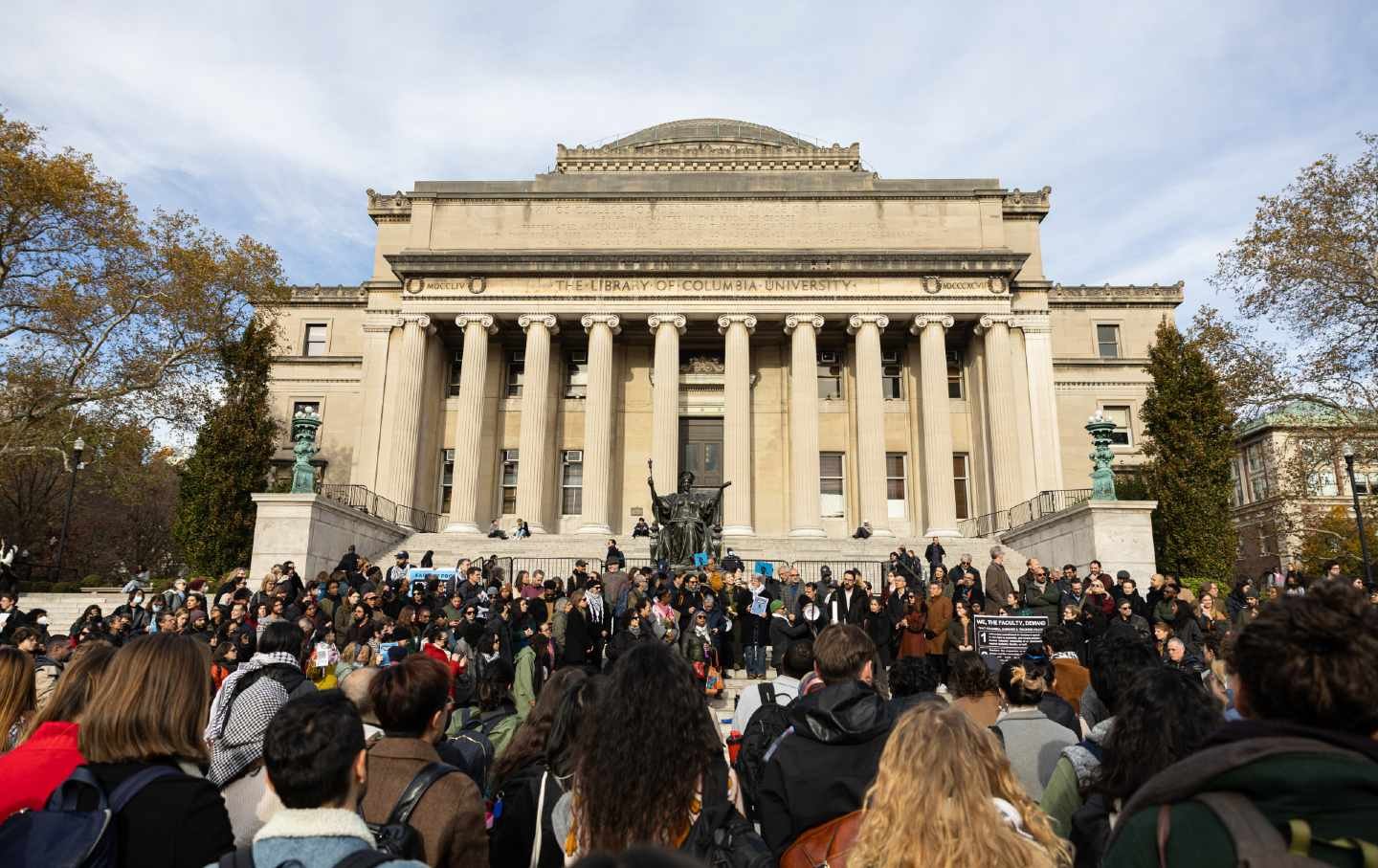Each year, every incoming undergraduate in Columbia College—and many in the College of General Studies—begins their year with Homer’s Iliad. For years, the Iliad has held pride of place in the course we call Literature Humanities, or Lit Hum, our required year-long general-education literature seminar. This is not an easy text to read, and it is not an easy way to start one’s time in college. But students don’t come here for things to be easy.
The Iliad begins with an argument: The Greek chieftain Agamemnon is being forced to free a young woman he had captured and enslaved, and he has announced his intention to take another enslaved woman, the favorite of the hotheaded prince Achilles, in recompense. Achilles is furious, possessed by a somatic rage, the rage of being wronged that lives in the body. Even as he is “pondering/ whether to draw from beside his thigh the sharp sword…or else to check the spleen within and keep down his anger,” he begins to draw his sword.
But the goddess Athena stops him. She descends, grabs Achilles by the hair, and rebukes him: “keep clear of fighting,/ though indeed with words you may abuse him, and it will be that way.” The allegory suggests that only wisdom can overcome our bodily passions that drive us to retributive violence when we feel wronged.
Athena presides in statue form as Alma Mater over Columbia’s Morningside campus, on the steps of our administrative building, a traditional site for protest that spent much of this year surrounded by barricades. And Athena’s intervention in the rage of Achilles presides emblematically over what I have come to understand as the real work of this literature class, which has little to do with great books.
I have taught this course for over a decade. I tell new instructors that they thought they signed up to teach literature to college students, but in fact they signed up to teach high school seniors how to be college students. To come to college is to be immersed in new social and intellectual milieus, surrounded by ideas and people that may be strange, unknown, or challenging. Your roommate, the person across from you at the dining hall, or the person next to you in class might say something or wear something or simply by their bodily presence represent something that makes you feel uncertain or even threatened. And to be a student in community with other students, to be a citizen, means learning what to do with those feelings.
In a first year filled with lectures, our seminars are some of the only classrooms where students can learn how to truly see, and be seen by, their classmates. In this space, and using the unique affordances of literature—which offers both access to profound questions and a safe, low-stakes venue for disagreement and debate—students learn how to sit with their discomfort at new ideas, how to transmute discomfort into something productive, how to interrogate not just their ideas and the ideas of others but also their responses to those ideas. That is the secret, vital alchemy of the freshman seminar: that the reading of literature together, in community, is not just the pursuit of insight and knowledge but also the fostering of social-emotional development and maturation.
Preparing a diverse student body to be citizens in a pluralistic democracy, or even to just be adults in their relationships and lives, is the mission at the heart of undergraduate liberal arts education. And it is precisely what the leadership of Columbia University tossed aside last November when it began its formal crackdown on protest against Israel’s war on Gaza.
On November 10, 2023, in the same kind of press release it uses for Nobel laureates, the university announced that it had suspended two student groups, Jewish Voice for Peace and Students for Justice in Palestine. The stated reason for the suspension was the groups’ apparent violation of a new events policy, which would turn out to have been rewritten in secret not long before, but the announcement also—for no apparent reason—declared that the groups had engaged in “threatening rhetoric and intimidation” at a protest.
That charge was never substantiated. The students had not been threatening or intimidating at the protest in question. So whence the accusation? In a leaked recording of a private meeting, one administrator can be heard gamely suggesting that Jewish students might feel threatened hearing Israel being accused of genocide. But feelings, as they say, are not facts.
The weeks and months after the attacks of October 7, 2023, were a time of great pain for many. For many members of our campus with ties to Israel, that pain was clearly acute, as was their distress that others seemed not to feel the same pain. But various parties sought to exploit the grief of October 7 to retake political and rhetorical ground lost to the generational shift in attitudes toward Israel’s occupation of Palestine. Professions of care and protection toward those grieving Israel’s dead came wrapped as bows around measures of repression and harassment against the usual targets.
A colleague whose September lectures about public health in Gaza had merely offended some in the audience suddenly became, after October 7, the target of official complaints, workplace harassment, and media attacks. And so even as parties stepped up claiming to protect the feelings of (some of) those grieving or afraid, their willingness to manipulate that grief and those fears to suppress of speech, betrayed their lack of real concern for anyone.
The university’s baseless charge of “threats” against SJP and JVP, like its subsequent creation of its Task Force on Antisemitism, fits into this pattern. The idea that protests against Israel’s actions constitute in themselves “threats” indulged an extreme ideological position, one whose function is to crush all criticism of that state.
The inauguration of this idea as de facto policy of the university—indeed, as our new de facto speech code—spoke to many of us. To the donors and politicians baying even in November for the punishment of protesters, it announced that the university would comply with those calls for discipline. To students and faculty, it promised that speech on behalf of Palestine would never be given a fair hearing on this campus. That promise was fulfilled in the doomed, bad-faith negotiations with encamped protesters that precipitated last week’s building occupation and subsequent police raid.
But it also spoke to instructors, telling us that our specific and sacred work of cultivating in students the wisdom of Athena would take a back seat to the politicization of speech. Our work is, in part, to help students learn to recognize when they have actually been threatened or harmed and when they simply feel fear or confusion. That work helps us keep everyone safe. It helps faculty among ourselves and in our classrooms to identify real prejudice and real harm. It helps students learn to understand the effects of their speech and actions. It helps all of us to cut through the noise of terms like “political correctness” and “wokeness.” And it helps us teach young people that they can offend or hurt without meaning to; that to do so is not a moral failing or a crime but something to recognize and acknowledge.
It also helps us see when a feeling of fear or confusion or anger is just that—a feeling. It helps us guard against those moments when, like wronged Achilles, we reach for the nearest weapon at hand—when we feel singled out, and acutely conscious in some aspect of our identity, and accuse the person who has wronged us of prejudice against that part of us. This is a common experience, if not one we discuss much: the student who has never gotten a B before and accuses an instructor of racism, the student who sees in a classmate’s disagreement an intentional attack on them for their gender. Only by navigating these moments with wisdom and clarity can we protect the potent language of prejudice and harm for incidents where they are really at play.
This is what a freshman seminar space allows, what our instructors work hard to learn how to do. But in November, we got a new rulebook. All of the above would be superseded by a new directive: In the case of speech about Israel-Palestine that upsets those with strong commitments to the state of Israel, all feelings would be considered facts, and all perceptions of threat would be treated as real ones. If you feel a commitment to the state of Israel and you see a keffiyeh or the flag of Palestine and don’t like it, the full force of university discipline and policy will be at your disposal.
Popular
“swipe left below to view more authors”Swipe →
It was this sabotaging of my educational mission, along with the advertised erasure of anti-Zionist Jewish students and faculty like myself, that first mobilized me into campus activism. And I was not alone: Faculty massed in mid-November around the statue of Athena to protest these suspensions, and a chapter was formed of Faculty and Staff for Justice in Palestine to support our students and carry on their mission.
I struggle to adequately state the extent of the university’s failing. It contradicts core tenets of freedom of expression enshrined in our university statutes, which affirm that “free expression would mean little if it did not include the right to express what others may reject or loathe.”
But worse, the effects on combating real prejudice were immediate and calamitous. Actual prejudice against Jews became hard to combat, because any discussion of antisemitism was tainted by the nakedly repressive project of the university. I fear that student protesters struggled to sufficiently distance themselves from real harassment of Jewish or Israeli students in part because the charges of such prejudice had been so delegitimized. Meanwhile, actual prejudice and violence against Muslim and Palestinian students went unaddressed and sometimes unreported to an institution that obviously had no capacity or interest for addressing them on the same scale.
In January, Jewish and Palestinian students protesting the war were sprayed with a noxious chemical agent by two other students, both apparently veterans of the Israeli military. Several students ended up in the hospital, and the university has remained virtually silent on the incident.
Meanwhile, the university’s Task Force on Antisemitism could only manage to hold “listening sessions” and then, in March, to issue a report calling for more law-and-order policing of protests and speech on campus (its wish being granted effusively in recent weeks). One of the Task Force’s cochairs sat next to Columbia President Minouche Shafik in front of Congress on April 17 and affirmed the conflation of criticism of Israel with antisemitism.
More on Campus Encampments
As the university abandoned students, faculty and staff stepped into the breach. Protests on behalf of Palestine continued through the year, and increasingly harsh disciplinary measures were brought against them. Faculty have spent hundreds of hours accompanying students to these disciplinary meetings, particularly at Barnard College, where the discipline was especially harsh. In some cases, only faculty intervention seemed to get absurd charges dropped or excessive punishments abandoned.
The Gaza Solidarity Encampment was first erected on April 17, while university leadership was in front of Congress, betraying the university’s reputation; the next day, after a police sweep, the camp went back up almost immediately. Peaceful, orderly, centrally located but obstructing no traffic, it was arguably a model protest encampment in the grandest traditions of the American university (and this campus).
The unobjectionable execution of this protest made it infuriating, and a target, to those who objected to its substance. On April 21, a professor from the uptown Business School who had spent the year harassing students and faculty via social media announced his intention to walk the next day into the encampment with armed guards and provoke a confrontation.
After months of repression, the students of the encampment could not turn to our Public Safety office. So members of Jewish Voice for Peace who were part of the encampment reached out to the group of Jewish faculty who had sent a letter to President Shafik weeks before the congressional hearings to challenge the weaponization of antisemitism. On short notice, Jewish faculty and staff got trained in de-escalation, found some neon vests, and were on hand at the camp the next morning to defuse any confrontation with the faculty provocateur.
Our colleague was denied access to campus, and the confrontation was averted. But provocateurs remained a problem, and the students asked faculty to continue their de-escalation duty through the week, as troublemakers proliferated and media attention intensified. More faculty and staff joined. Shifts were planned. More vests were bought. The camp had a simple rule: Anyone was welcome to enter if they agreed to abide by community rules of conduct. Members of the media could enter at certain times and in limited numbers. All week, faculty and staff in vests were on hand to defuse confrontations—and to act as observers in case the police returned; we knew that, simply by being there, we might be able to keep our students safer.
This work clarified much for us about our role as faculty. It became undeniable that our duty of care toward our students obliged us to protect them not only from the university but where the university could or would not. It became apparent how badly eroded the moral authority of the university was by their politicization of speech and discipline and that the students were some of the few left on campus with clear principles—even in the face of vicious and racist attacks against them by lawmakers on our very campus that our leaders did nothing to refute.
Faculty and staff seen in the vicinity of protest encampments have become a political target to those still slavering to get professors fired. A dean was overheard saying they had “a list” of every faculty member they observed in a vest on a particularly busy day last week. The same surveillance and repression that has been leveled against students is now turning toward faculty and staff, who have stood all year in the breach left by the university’s abdication of its moral authority in a time of crisis.
Early April 30, students occupied Hamilton Hall, renaming it Hind’s Hall after the 6-year-old Palestinian girl whose death became emblematic of the ongoing bloodshed in Gaza. The campus was locked down. Faculty spent the day attempting to intervene, offering to try to defuse the situation by speaking to the students inside, but the administration rebuffed or ignored them. The university and police had already decided on the outcome, and that evening, hundreds of police with siege equipment and firearms stormed the building. One officer discharged a gun, apparently by accident. Students released from custody over the next two days showed signs of lacerations and bruises, including injuries sustained in police custody, and reported degrading and humiliating treatment in custody, including the ripping of headscarves off of Muslim women.
At both Columbia and NYU, where faculty as well as students were arrested in the violent clearance of an encampment, graduation (often called “commencement”) is scheduled for May 15. May 15 is also Nakba Day, which commemorates the mass dispossession of Palestinians in 1948 that accompanied the creation of the modern state of Israel.
Since the day the Gaza Solidarity Encampment went up, one talking point has been on every administrator’s lips: The camp had to be cleared so that commencement could be held on the lawn as usual. We were reminded again and again that this year’s graduating seniors also lost their high school graduation to the Covid-19 pandemic. At a recent meeting of the university senate to discuss the April police action in which over 100 students were arrested, a university leader again rehearsed this line, and a senator next to me sighed, “Graduation, graduation, graduation.”
After the police raid on Hamilton Hall, Shafik announced that the NYPD would be staying on campus through May 17, presumably to maintain order for commencement. But on May 6, Columbia announced that university-wide commencement would not be held, in favor of smaller ceremonies for individual schools. The police, it seems, will remain. And so our graduating seniors have one final, valedictory lesson: the vacuity and emptiness of every rationale the university has offered, all year long, and the clarification of the fundamental objective of every step they have taken: to suppress disapproved political speech.
We speak in the academy of the “Palestine exception” to free speech: that you can protest about any topic except Palestine. Our graduating students bid farewell to an institution now involved in what we might call the Palestine example: Israel-Palestine as one of those special causes, like police violence in 2020, against which the total force of suppression is brought to bear, and an example is to be made of any who dare protest. The Columbia and Barnard classes of 2024 have had the misfortune of an unusually clear education in the nature of power in and around the academy. Whatever they thought a university was when they applied, when they arrived in September 2020 prepared to dig into Homer’s Iliad, they graduate now knowing fundamental truths about what a university actually is that even my colleagues and I are struggling to truly grasp.
I worry that little at our disposal as faculty prepares us for what’s next. A trusted senior colleague opined that once again the “radical right and radical left are trying to silence one another,” and I had to point out that, although the anti-war protesters have at times used chants and tactics I abhor, the calls for silencing and suppression have come from just a few allied camps, and been directed at just a few forms of speech. We will not both-sides our way through to any accurate account of reality, and we cannot more-dialogue our way through it if we can’t identify the particular enemies of expression. And we cannot build something to fill the void left by our leaders if we can’t reverse the polarization imposed on us by their failures.
In this moment of bafflement and rage, faculty find ourselves faced with the unthinkable, the never-before-seen. We rack our brains for the next step, for the path out of or at least through this. Abandoned by our university leaders, who treat us with the same contempt and hostility they direct at our students, all we have is our collegiality with one another, and the work that sustains us all—the teaching of our students. Perhaps, in the end, that is all we have ever had.
Thank you for reading The Nation!
We hope you enjoyed the story you just read, just one of the many incisive, deeply-reported articles we publish daily. Now more than ever, we need fearless journalism that shifts the needle on important issues, uncovers malfeasance and corruption, and uplifts voices and perspectives that often go unheard in mainstream media.
Throughout this critical election year and a time of media austerity and renewed campus activism and rising labor organizing, independent journalism that gets to the heart of the matter is more critical than ever before. Donate right now and help us hold the powerful accountable, shine a light on issues that would otherwise be swept under the rug, and build a more just and equitable future.
For nearly 160 years, The Nation has stood for truth, justice, and moral clarity. As a reader-supported publication, we are not beholden to the whims of advertisers or a corporate owner. But it does take financial resources to report on stories that may take weeks or months to properly investigate, thoroughly edit and fact-check articles, and get our stories into the hands of readers.
Donate today and stand with us for a better future. Thank you for being a supporter of independent journalism.
Thank you for your generosity.
More from The Nation
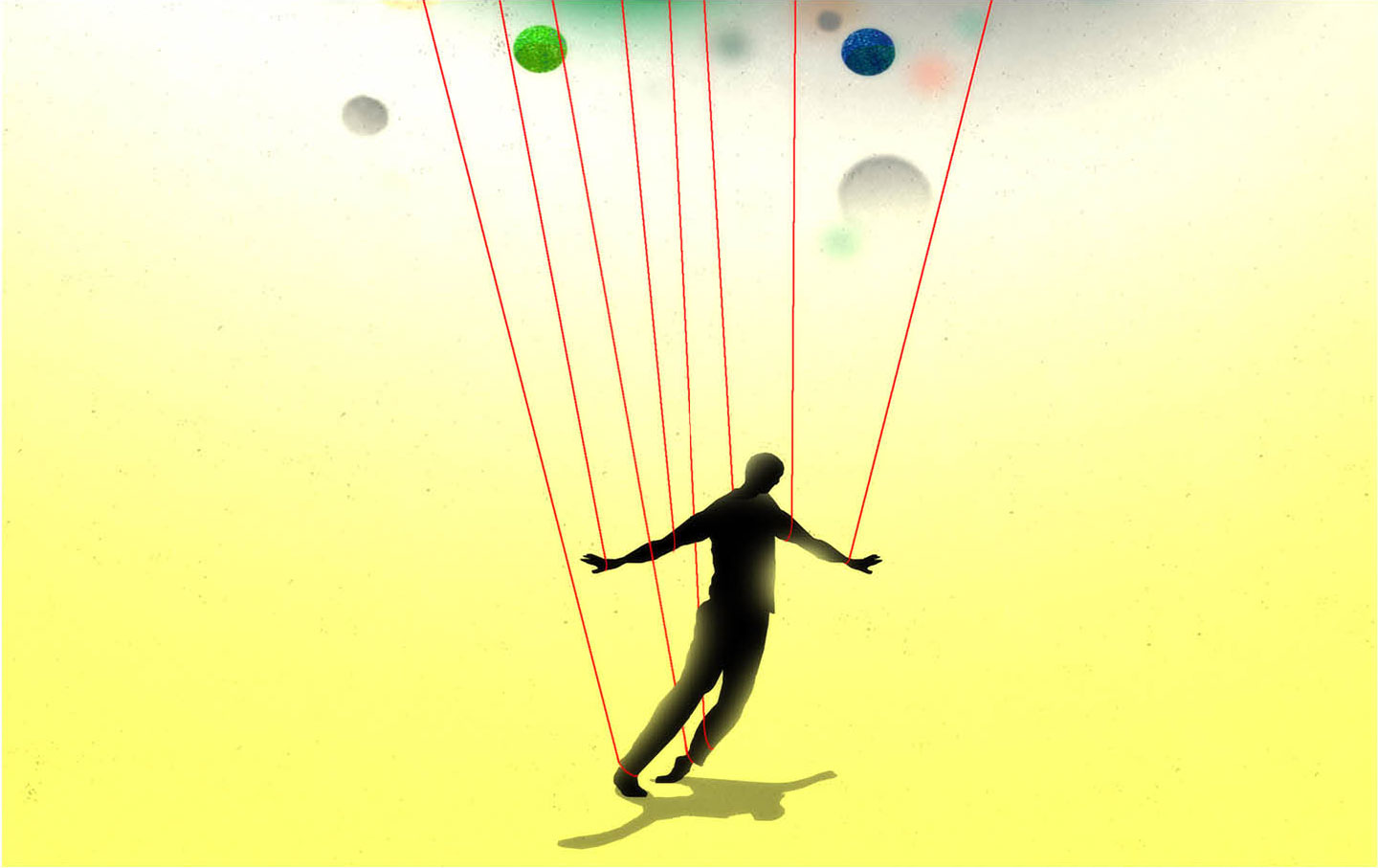
Psychedelic-assisted therapies have been hailed as the wave of the future. They’re also becoming big business. What if most people can’t afford them?
Feature
/
Alissa Quart

Since Roe was overturned, thousands of people in red states have found a way to get an abortion—often thanks to providers operating at the edge of the law.
Feature
/
Amy Littlefield
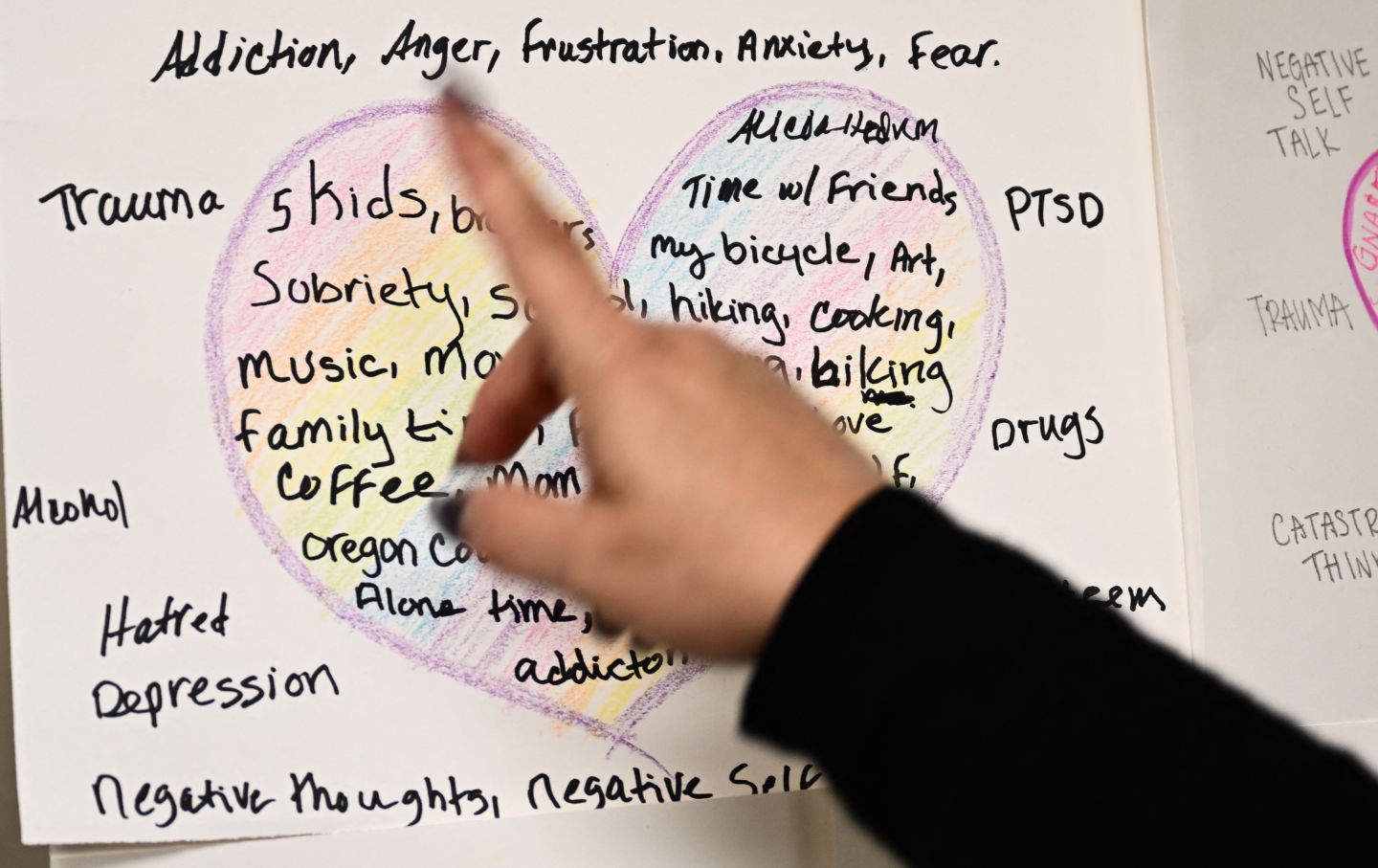
The state’s landmark decriminalization initiative wasn’t given a real chance.
Comment
/
Lydia Kiesling

Restrictive laws don’t just take away the right to choose, say physicians and ob-gyns, but also prevent proper treatment of pregnancies.
Column
/
Katha Pollitt
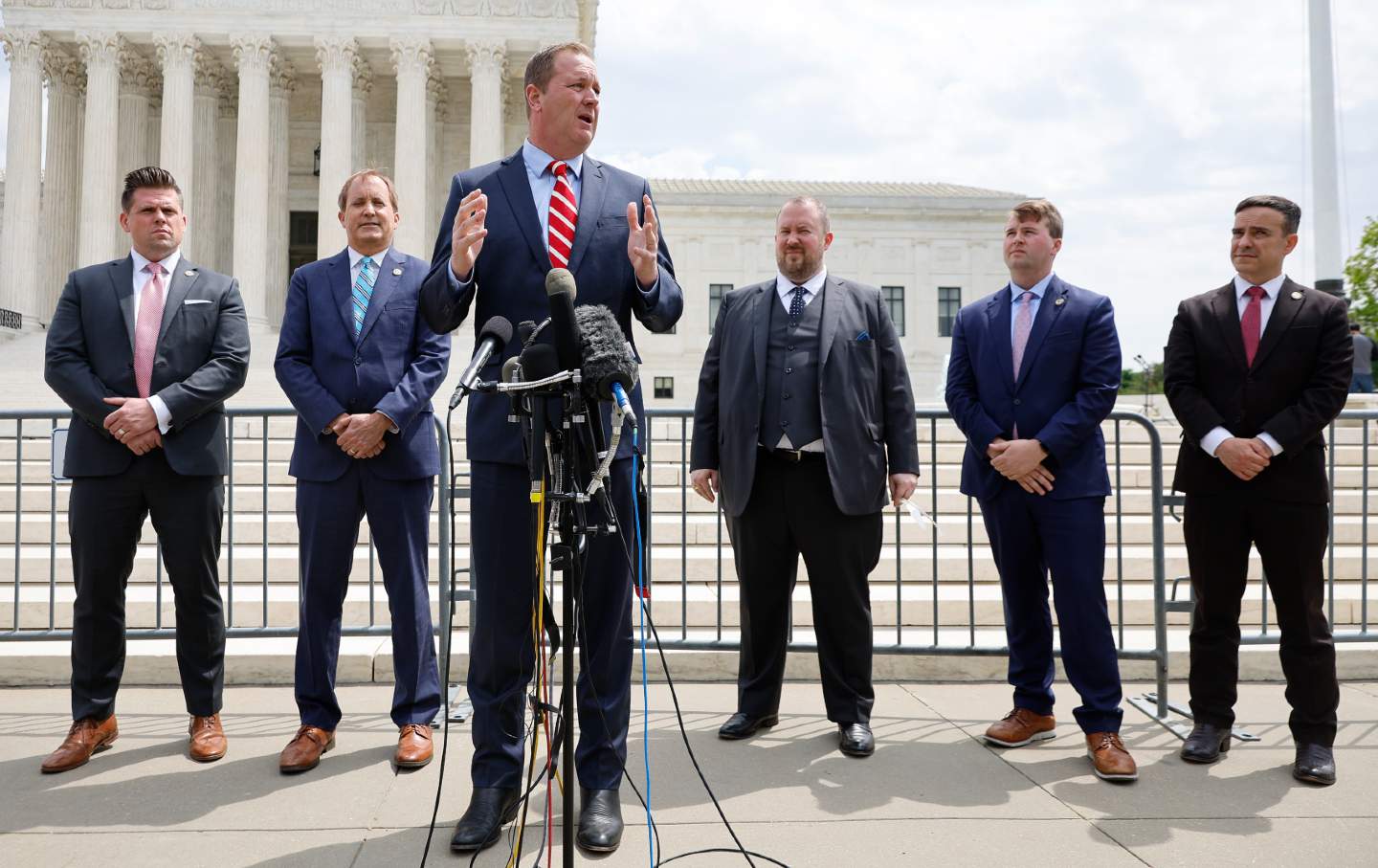
The Republican Attorney Generals Association is waging a legal war to overturn reproductive rights, LGBTQ rights, and climate regulations, one state at a time.
Column
/
Elie Mystal
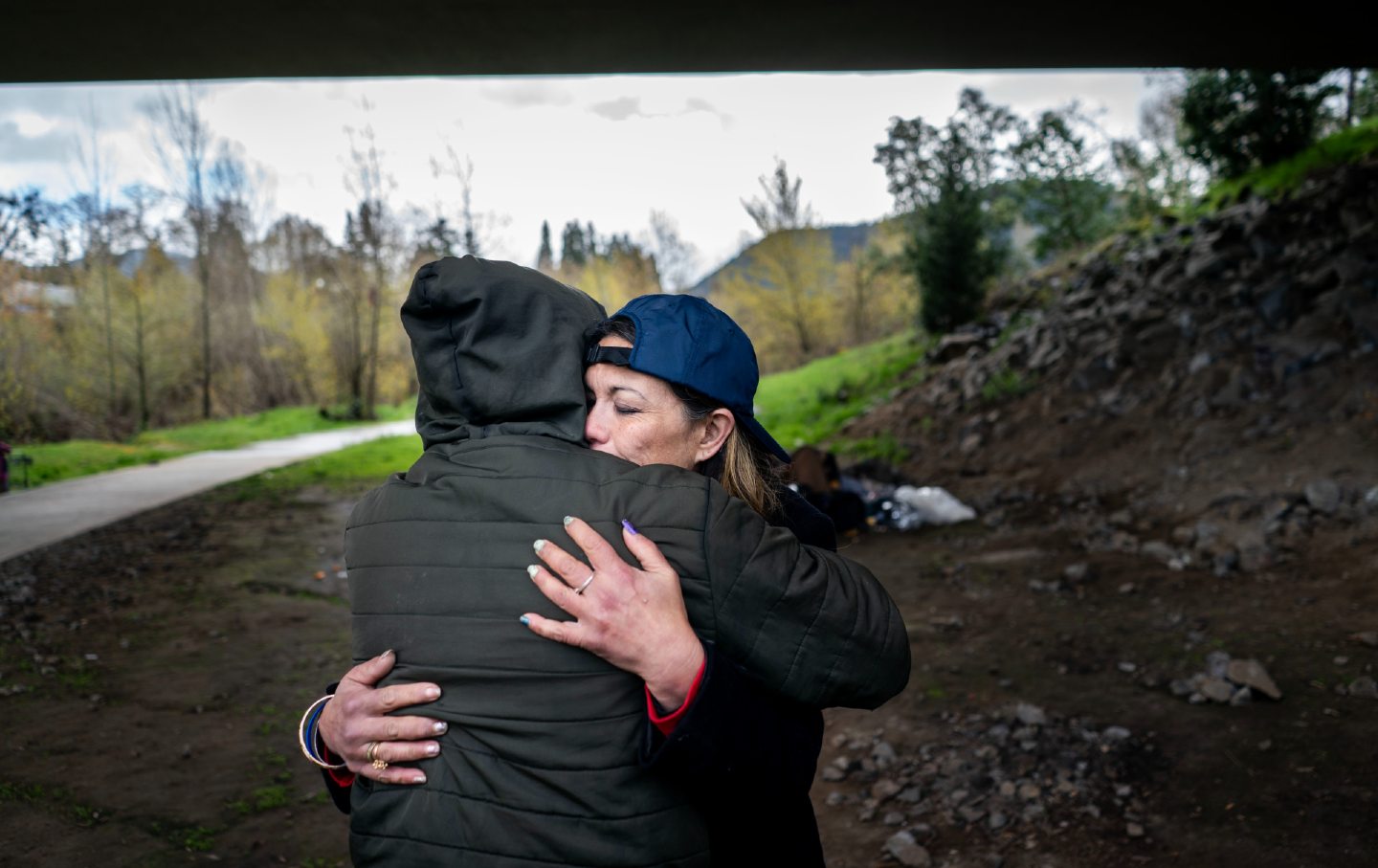
With Grants Pass, the Supreme Court appears set to allow cities, counties, and states to criminalize homelessness.
Comment
/
Jeremiah Hayden

Felecia Phillips Ollie DD (h.c.) is the inspiring leader and founder of The Equality Network LLC (TEN). With a background in coaching, travel, and a career in news, Felecia brings a unique perspective to promoting diversity and inclusion. Holding a Bachelor’s Degree in English/Communications, she is passionate about creating a more inclusive future. From graduating from Mississippi Valley State University to leading initiatives like the Washington State Department of Ecology’s Equal Employment Opportunity Program, Felecia is dedicated to making a positive impact. Join her journey on our blog as she shares insights and leads the charge for equity through The Equality Network.

